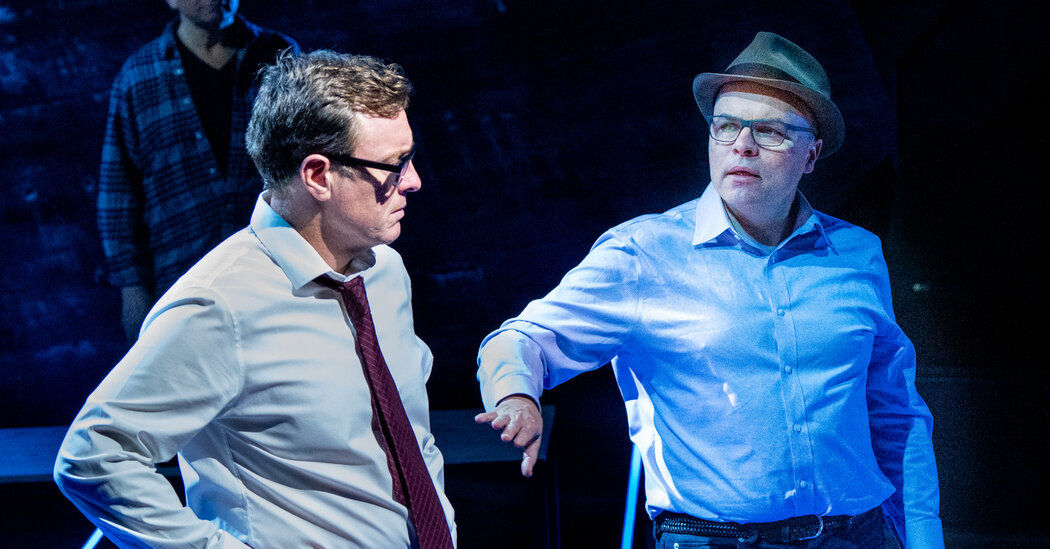A now-faded note card taped above my desk reads: “Art, like light, needs distance.” Years ago, I wrote down that line from William Gass’s “On Being Blue,” and over the last few months it was a comforting reminder as I finished my new play “Corruption.” What was to be a history play about a media scandal in Britain has become a political thriller about some of the forces that seem to be upending our own country right now.
The inspiration came in 2012, while reading “Dial M for Murdoch: News Corporation and the Corruption of Britain,” a book by Tom Watson and Martin Hickman. Watson, a former member of the British Parliament, and Hickman, a former reporter for The Independent, had written of how Rupert Murdoch’s British newspapers and tabloids, including News of the World, were illegally hacking the phones of thousands of citizens — from celebrities to former prime ministers and even a missing 13-year-old girl, who was later found dead — all to get sensational stories that would sell newspapers. As the book made clear, more papers sold meant more profit; more profit meant more power to influence the levers of government.
The further I read, I realized that this could be a remarkable play. Like Bob Woodward and Carl Bernstein’s “All the President’s Men,” “Dial M” told a riveting story in granular detail about the use and abuse of power as a small group of vivid characters seeks to expose crimes that threaten their very democracy. Onstage it could become a sweeping tale in which the main characters take huge risks for their beliefs.
In an effort to adapt the book, I sent the authors two of my plays — “The Overwhelming” and “Blood and Gifts” — that are also about politics and power. Then I flew to London, and went down the rabbit hole.
Most of the key players would talk to me off the record only if they were certain that the Murdoch machine was unaware of our meeting. Even though News International, the British newspaper division of Murdoch’s media empire, was under investigation and Rupert and James Murdoch had apologized for their company’s actions in testimony before Parliament, people were afraid of speaking out because of the fear of retribution.
Many public figures and politicians who spoke out against Murdoch’s papers have revealed that those same papers tried to destroy their careers and ruin their lives. One such case involved a member of Parliament named Chris Bryant. During a parliamentary hearing, he got Rebekah Brooks, then the chief executive of News International, to acknowledge that News International had made payments to the police for information. Soon after, a rival paper published a photograph of him in his underwear that he had posted on a dating site, and then the Murdoch press ran with the story.
In places like the members-only House of Commons Library and a curry shop northwest of Birmingham, I spoke with journalists, politicians and lawyers who were working to expose journalistic malfeasance. My sources repeatedly described feeling as if they had entered an alternate reality. Or rather, that they were living in reality while their fellow citizens were living in News International’s hall of mirrors, where lies and half-truths mingled with facts. In Britain, libel laws are such that if you sued News International and lost, you would have to pay the company’s legal bills. The fear of bankruptcy kept people silent.
All spoke as well about Brooks, who resigned from News International after her arrest on suspicion of illegal phone hacking and obstruction of justice. She was one of the most admired and feared people in British media, the visionary behind her newspaper’s dominance.
When Watson, who later served as the parliamentary whip for Prime Minister Gordon Brown, publicly called for Tony Blair to step down as prime minister, Brooks, according to “Dial M,” saw this attack on Blair, her favored prime minister, as an attack on her power as well. In response, her papers linked him to a conspiracy to promote damaging rumors about members of the Conservative opposition even though Watson had no knowledge of the plot. Reporters descended on his home and hounded his family, he wrote in his book. The struggle between Watson and Brooks would be the heart of my story.
The other characters would include Charlotte Harris, the fast-talking lawyer who sued News International and won a million-pound settlement for her phone-hacked client; the suave, wealthy Max Mosley, whose sex life was secretly filmed by Murdoch’s journalists, and who then bankrolled the legal fight against News International; and Bryant, now one of the stars of the Labour Party, who, according to “Dial M,” was targeted by a stalker after those photos were published.
I remained determined to bring this to the stage, but I couldn’t crack it. So, I set it aside. Even as I wrote other works, I kept in touch with the people I’d interviewed and followed the story’s developments. In 2012, it seemed as if the phone hacking scandal would break Murdoch’s British media empire, that Brooks would be found guilty of conspiracy to hack voice mail messages, and that Prime Minister David Cameron and his government would be run out of office for their cozy relationship with News International.
None of this came to pass. In fact, News International’s media influence grew. Brooks, after being acquitted, resumed running that company (now named News UK); Cameron remained in power; and Murdoch’s media helped lead the push for Brexit. And in the United States, with Murdoch’s Fox News helping bolster Donald Trump’s presidential bid, it seemed as if Murdoch’s outsize influence on politics was happening here.
The director Bartlett Sher, a longtime collaborator, had been watching it all unfold as well. During a call last spring, we agreed that the phone hacking scandal felt like a precursor to our own country’s struggles with pure falsehoods being pushed into the public sphere and throughout social media as a way to demonize political opponents, and a media empire wielding incredible influence as it pushed a political agenda. Distance and time had only made the story more fascinating, and somehow even more timely.
We approached André Bishop, the artistic director of Lincoln Center Theater, who programmed the play. The words then poured forth, fueled by a clarity gained from my conversations with Sher, an urgency of needing to talk about this story during an election year, and an actual deadline.
Now a cast of actors is relating the story that I crafted from “Dial M for Murdoch,” the interviews I conducted in England as well as follow-ups, and transcripts from parliamentary hearings.
I also invented scenes whole cloth — a dramatist’s privilege — to compress and convey what it took to stand up to a powerful adversary, what motivated them to press on. The theater remains a place where we can learn how our history illuminates our present. The goal of this play is to remind us that such knowledge can inspire us to cherish our democracy.
J.T. Rogers’s new play, “Corruption,” is onstage at Lincoln Center Theater’s Mitzi E. Newhouse Theater through April 14.

